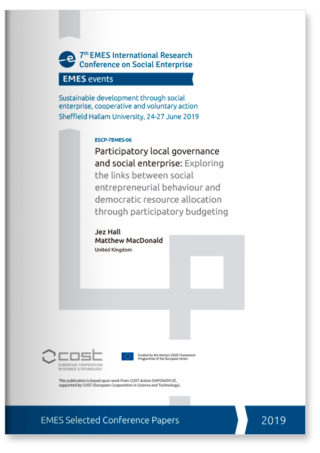Abstract
Participatory Budgeting (PB) is an innovation in participatory democracy. Inspired by social and political movements for citizen participation in Brazil in the 1980s which aimed to tackle democratic deficits and target public funds at the most marginalised communities (Abers et al. 2018; Novy & Leubolt, 2005).
It has since evolved, with over 3000 reported experiences globally (Shah, 2007). PB is now expanding rapidly in Europe and the USA. With that shift it can be argued that it has moved away from primarily promoting equity and re-distribution of resources towards a focus on public participation in public service delivery (Sintomer et al., 2012), with the legitimacy that brings for government.
We explored the extent to which PB can and does support the development of the local social economy, in particular the development of social enterprises and cooperatives. Through reflecting on the longitudinal qualitative learning of some key actors in the development of Participatory Budgeting in the UK, viewed through a social economy lens, we found that Participatory Budgeting, in and of itself, stimulates the development of new cooperatives and sustained social action, but mostly in instances where this was the specific intent.
There are clear indications that Participatory Grant Making, and neighbourhood based Participatory Budgeting does stimulate civic action, build new social capital and develop agency within participating individuals, particularly in the unique form of Participatory Grant Making most common in the UK. Participatory Budgeting may generate socially entrepreneurial behaviours, and express values commonly held within social economy organisations. If a specific intention behind Participatory Budgeting was to promote a vibrant autonomous social economy it may become a useful addition to existing models to stimulate social entrepreneurship, and thus create the right conditions for the social economy to flourish.
To read the full paper, please download the pdf




